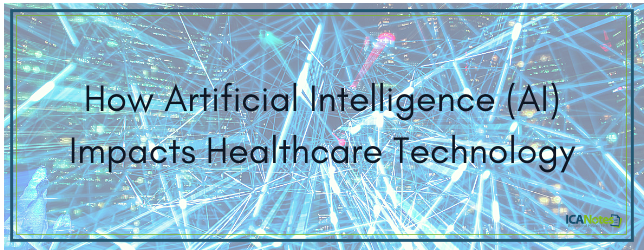How Artificial Intelligence (AI) Impacts Healthcare Technology
It is clear that the capabilities of artificial intelligence are increasing by leaps and bounds. AI is already making a huge impact on manufacturing, military strategy and even in our own homes. Health care is looking to be the next area in which artificial intelligence will make a huge impact. What can we expect from AI in the healthcare industry in the near future, particularly with respect to the fusion of AI and healthcare technology?
How Artificial Intelligence Impacts the Healthcare Industry
One of the most exciting applications of artificial intelligence in health care is the potential ability to communicate with those who have suffered neurological trauma, rendering them unable to speak and/or move. Artificially intelligent brain-computer interfaces have the potential to translate neural activities in such a way as to allow these individuals to interact effectively with the outside world.
Another critical application of artificial intelligence in health care is the use of more advanced testing tools. In the future, AI may enable us to get vital patient information that we can currently only obtain through invasive biopsies to capture physical tissue samples. Not only would this be much better for the patient, who would no longer have to undergo stressful and risky surgery, but it would also allow for more accurate diagnoses, as they would be based on the full examination of tumors rather than a tiny section.
An area of impact that many may not immediately consider but is nonetheless important is the combination of artificial intelligence and EHR software. One of the challenges of current electronic health records software is that some healthcare staff may find certain programs unwieldy, confusing and time-consuming.
It is vital that healthcare staff be able to keep records accurately and have enough time to take care of all their patients’ needs. While the goal of EHR programs is to streamline this process, it doesn’t always work out that way. Artificial intelligence programs can enable healthcare professionals to make use of more intuitive interfaces, including voice recognition and dictation, to record key data faster and more accurately.
The Current State of Behavioral Health EHR Technology
If you are in the behavioral healthcare field, there exists an intuitive, easy-to-use EHR program you can take advantage of right now. ICANotes is the most clinically robust behavioral health EHR, with record templates you can customize for your needs that rely primarily on point-and-click technology for fast and efficient patient care documentation. This technology is the next best thing to a fully AI EHR, with an intuitive interface, fully electronic data intake and management, and a streamlined, efficient billing system.
While you are waiting for Artificial Intelligence to revolutionize your billing and record keeping systems, why not make the process faster, more accurate and easier with the behavioral EHR program that is trusted by mental health professionals nationwide? Contact us today for a live demo of this software or to get a free trial to test it out on your own.
Related Posts:
How Tech’s Big 4 Could Impact Healthcare IT Usability
Tips for Keeping Patient Records Secure

